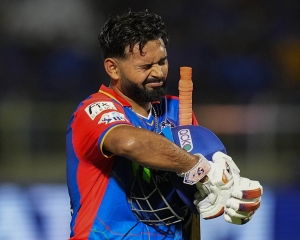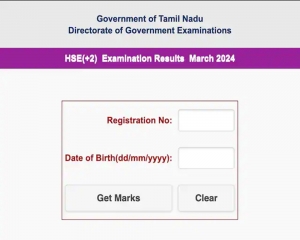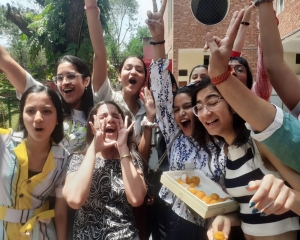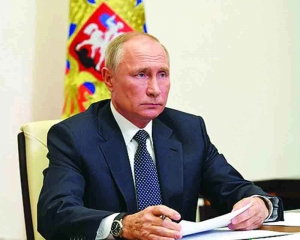The healthcare professionals at PGIMER share their experiences of the last three months taking care of the patients affected by the pandemic amid challenging working conditions and times
We stay at work for you. You stay at home for us.” This old viral message displayed in different pictures from healthcare professionals was an impassioned plea to the people to help “flatten the curve” as the world started to recognize the risk and impact of the unprecedented health emergency that is Covid-19.
Since three months back when medical professionals in the country realized that the Covid-19 (Coronavirus) is a deadly disease unlike anything they have treated before, they have not been breathing easy, putting their lives on the line to battle the contagious virus amid multiple challenges.
At the forefront in the fight against Coronavirus, the doctors and other healthcare workers in the country are not only faced with the daunting task of treating the positive patients but also dealing with long duty hours, limitations of the country’s public health system, heavy psychological burden, social stigma, risk of catching the disease and carrying the virus into their homes risking the lives of their family members.
At the Post Graduate Institute of Medical Education and Research (PGIMER), a tertiary care institution, the doctors treating the Covid-19 patients are also facing similar predicaments, made all the more acute due to the increasing burden on the institution with patients coming in from different northern states.
Dr GD Puri, PGIMER Dean (Academics) and Head of Department of Anesthesia and Intensive care tells, “These are extremely challenging and stressful times as we are facing a highly contagious virus.
From donning and doffing of personal protective equipment (PPEs) to remaining available 24x7 to treat Covid-19 positive patients, we are getting accustomed to the new normal. While the excessive workload is something the healthcare professionals have faced constantly at PGIMER, the current situation is entirely different.”
With more than 40 years of experience in the medical profession, Dr Puri is supervising the Covid operations at PGIMER’s Nehru Hospital Extension block, which is a dedicated Covid-19 hospital for critical patients.
“We underwent training to work in PPEs. However, as it is not possible to work for more than 6-7 hours wearing PPEs and also, to prevent infection exposure, doctors and medical staff have been placed on rotational shifts and have to follow self-quarantine and testing protocols.
In the past, healthcare workers from PGIMER and GMCH-32 have got infected and were treated here. A gynecologist, who got infected, is currently admitted at PGIMER for treatment,” he says.
On how the Covid-19 has changed his professional life, Dr Puri shares, “Covid-19 has certainly changed the way surgeries are now performed as surgeons have to don PPEs to carry out complicated surgical procedures. Recently, a Covid positive patient with a head injury was operated upon successfully in the hospital.”
“Despite all odds, an army of doctors, nurses and other healthcare staff are toiling hard to treat critical patients affected from Coronavirus,” adds Dr Puri as he introduced us to other doctors who are treating the Covid-19 patients in the PGIMER.
These doctors include those who are closely involved in the treatment of Covid-19 patients, those who are yet to begin their working shift for the day while some of them have completed the 7-10 days working shift and post-shift quarantine protocol.
Some of the doctors preferred self-quarantine at home, others opted for the five-star hotel and also, the makeshift arrangements for lodging frontline staff within the hospital premises.
Sitting next to Dr Puri, Dr Vipin Kaushal, Additional Medical Superintendent and in-charge Covid Hospital recalls, “In the initial days, many health workers were reluctant to come forward to work in the dedicated Covid-19 facility as it is an invisible disease with many asymptomatic patients undergoing treatment and there are significant chances of getting infected due to fatigue-driven breach of personal protection.”
Dr Ashu Rastogi, Assistant Professor, Department of Endocrinology and Metabolism, who has completed his working shift and will observe seven-day self-quarantine shares, “The current situation is taking a toll on both physical and mental health of medical professionals.
We never imagined in life that we would be working in PPEs for six-seven hours. It is really tough to work in temperatures above 40 degree Celsius wearing thick-material PPE which results in excessive sweating since ACs remain switched off to prevent the virus from spreading. You cannot eat or drink due to fear of contamination. I have seen my colleagues fainting due to exhaustion while working in PPEs.”
Narrating his personal experiences, Dr Rastogi says he has not met his two teenage children from the past ten days since he began his duty in Covid ward and will not be able to see them for another seven days.
There is always a fear of getting infected and passing on the infection to our family members. While I have opted to stay at home, I live in a separate room and do not meet my family members. My wife, also a doctor, works at a private clinic and often counsels our children to make them understand the difficult situation everybody is going through during the pandemic, he says.
The senior doctor informs that he will also be undergoing Covid-19 test as per the safety protocols.
Sharing the experience of treating Covid-19 patients, he says, “It is a tough time for doctors, patients and their relatives. As no relative is allowed to stay with the infected patients, it is the health workers, who are their only caretakers.
The patients are usually various anxious with a lot of questions about coronavirus. Due to the feeling of loneliness and isolation, they even cry sometimes…Both doctors and patients are not allowed to use phones inside the ward. So sometimes, we use a dedicated phone to allow the patients to connect with their family members.”
Just like Dr Ashu, his colleagues are following strict protocols and trying to stay rational and scientific minded, to cope up with the stress and overcome pervasive uncertainty in the midst of the coronavirus pandemic.
The deadly disease has not only changed their professional lives but also changed their relationships with their families and co-workers as they all are struggling under the psychological weight of the crisis.
As we approach mid-June, the medical professionals recognize the threat of spread of infection and also, stresses that it’s high time people start following the safety protocols and make adjustments to live in the new normal.
The doctors feel that more needs to be done to fight the coronavirus and government and medical staff, alone cannot achieve their goals of maximizing survival unless the people of the country starts following the health protocols religiously.
During the half an hour conversation with The Pioneer, the team of doctors shared their thoughts about Central Government’s unlock 1.0 rules, limitations of Indian healthcare system, stigma associated with the Covid-19 patients and health workers treating them, concern over misinformation about Covid, impact on non-Covid patients, trail of plasma therapy, and many more issues.
Dr Ritesh Agarwal and Dr Pankaj Malhotra say, they are concerned that despite repeated warnings, people continue to roam around the streets freely without wearing masks.
They are also of the opinion that the healthcare workers need to be extra cautious because if they begin to fall sick during this crucial time, the already strained healthcare system might edge closer to its breaking point.
Dr Ritesh, Department of Pulmonary Medicine tells, “Unlock 1.0 announced by the government was a necessary step to recover our economy, which is in shambles. But people need to understand that we are still dealing with Coronavirus and no vaccine has been developed yet.”
“We see vulnerable people like senior citizens and children below the age of 10 years strolling in parks. This disease does not spare anyone and even a two meters distance is not enough to stop the transmission.
As responsible citizens, we all need to take care of vulnerable people and should step out of our house only when necessary… I myself have not met my aged parents for the past three months to ensure their safety,” he adds.
Expressing concern over the impact on non-Covid patients during the past three months, Dr Pankaj Malhotra, Department of Internal Medicine says, “I feel bad about the collateral damage due to the Covid-19. Patients faced delayed diagnosis, dialysis, surgeries and treatment for several medical illnesses at the cost of trying to prevent exposure to the virus.”
Speaking about India’s fragile healthcare system, Dr Pankaj says, “India just spends a little over one percent of its GDP on public health. This is a wakeup call for us… We are hopeful that we will eventually overcome this pandemic. But then a new infection is going to come and the health care system should be developed to deal effectively with a crisis like situation.”
As the conversation continues, we also overhear some discussions among the team of doctors about stigma around the Covid-19, collapsing healthcare system and how the PGIMER is overburdened with never-ending inflow of patients from northern states.
Since the pandemic hit the country, there have been numerous developments that contributed to the hardships of doctors including shortage of medical equipment and protective gears, enduring physical violence as well as social stigma and being evicted from their homes by landlords.
While working under the expanding dark shadow of the virus, several doctors have lost their lives in the past three months. Also, shocking pictures have emerged from some parts of the country where the healthcare workers were seen wearing raincoats and motorbike helmets to protect themselves amid the shortage of PPEs.
There have been some positive developments too. As the medical professionals are the ones shouldering most of the weight during this pandemic, insurance covers, other incentives, special quarantine facilities have been announced for them by the Central Government as well as the State Governments.
Commenting on the reports of unruly behavior with medical professionals, Dr GD Puri says, “This is a part of life. Sometimes people consider doctors as God and if anything goes wrong, they start abusing them and beating them. Doctors have also been evicted from rented accommodations due to fear of infection.
These are testing times for everyone and we want to focus on positive aspects.” He further says, “Currently, there are 12 patients in Covid hospital under treatment. The PGIMER has so far treated and discharged more than 250 patients. It brings us a sense of hope and contentment when a recovered patient happily walks out of the hospital after being treated.”
Elaborating about the treatment facilities, Dr Puri informs, “At PGIMER, we are using a system built in-house to remotely monitor Covid-19 patients. The in-house system collects data related to heart rate, blood pressure, temperature, oxygen level among other vitals of the patients. This data can be monitored by the doctors either in office or at home. The patients are also monitored through CCTVs.”
Besides treating Covid patients at the PGIMER’s Nehru Hospital Extension block, the institute has also begun trial of convalescent plasma therapy in patients with serious infection and had earlier assessed the safety of Mycobacterium w (Mw) in four hospitalized infected patients.
A 60 years old male patient from Haryana’s Kurukshetra, who was administered convalescent plasma therapy at PGIMER has fully recovered and was discharged on June 12.
Giving details, Dr LN Yaddanapudi, Department of Anesthesia and Intensive Care tells, “PGIMER is conducting trials of convalescent plasma therapy among positive patients. A 60 years old patient from Kurukshetra was admitted in PGIMER in a serious condition with pneumonia requiring oxygen therapy. After plasma therapy and supportive care, he has fully recovered and discharged from the hospital.”
“This is the first patient in PGIMER who has received plasma therapy and recovered. In this trial, anti-bodies from the blood of patients who have recovered from Covid-19 infection are used to treat infected patients. We are looking forward to more such successful trials,” he adds.
As we were nearing the end of our conversation, the doctors reiterate that dealing with coronavirus is a new experience for all of them and they do find it unnerving at times.
“We do not know where things stand at present. It may be the calm before the looming storm as there is a lot of uncertainty about how long the pandemic will last,” the doctors say
“But life has to go on… even as we are all in for the fight of our lives,” they conclude before heading towards their respective Departments for yet another day to lead the fight against Covid-19 pandemic.

























